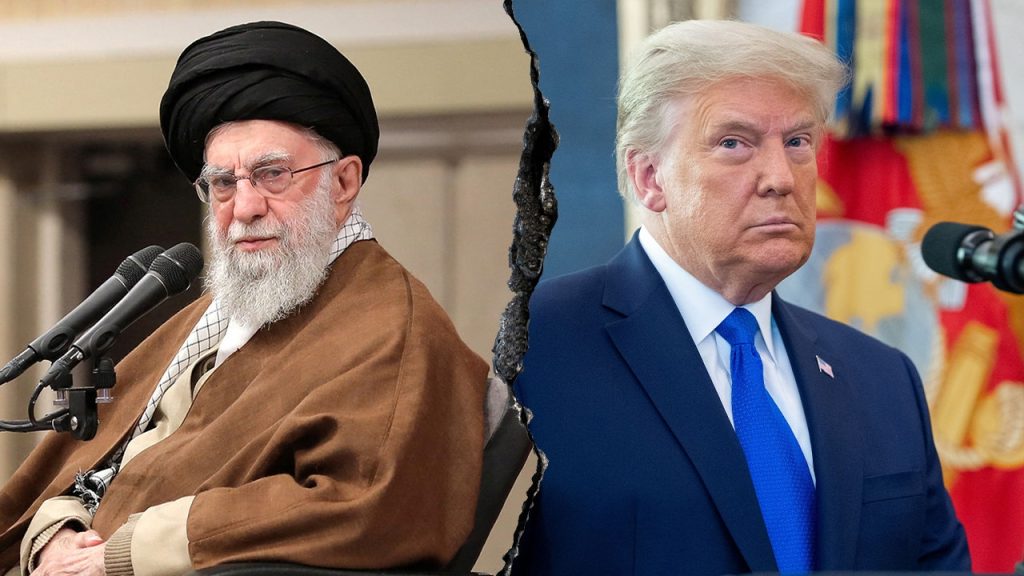In a recent address, President Donald Trump indicated a growing concern over potential military actions related to Iran amid escalating nuclear negotiations. While he refrained from declaring an imminent attack by Israel on Iran, he acknowledged the rising tensions and outlined measures for U.S. personnel in the Middle East. As discussions regarding Iran’s nuclear capabilities continue, the situation appears precarious, leading to evacuation advisories for military dependents in the region.
| Article Subheadings |
|---|
| 1) Trump Addresses Rising Tensions |
| 2) Evacuation Orders for Military Dependents |
| 3) Ongoing Nuclear Negotiations With Iran |
| 4) Iran’s Enrichment Activities Under Scrutiny |
| 5) International Reactions and Future Predictions |
Trump Addresses Rising Tensions
President Donald Trump recently commented on the delicate situation regarding Iran, stating that while he does not consider an immediate military strike to be imminent, he recognizes that it “could happen.” His words highlight the escalating concern over Iran’s nuclear aspirations, which U.S. officials view as a significant threat to regional stability. Trump asserted, “Iran cannot have a nuclear weapon,” emphasizing the administration’s firm stance against Iran’s nuclear development.
Trump reiterated his desire for peaceful negotiations, saying, “I would love to avoid conflict,” indicating an interest in reaching an agreement with Iran. However, this approach requires Iran to be more compliant, particularly regarding its nuclear program, which remains an obstacle in talks between the two nations.
Evacuation Orders for Military Dependents
In light of the escalating tensions, evacuation measures are being implemented for U.S. military dependents in the Middle East. The Department of Defense has authorized the voluntary departure of dependents from various military bases across the region. This decision was influenced by rising hostilities and the precarious security environment surrounding Iranian territories.
Reports indicated that military dependents have been advised to leave Iraq and other specific locations due to potential threats. The U.S. Embassy in Iraq has initiated a partial evacuation of non-emergency personnel as an added precaution. One official stated, “They are being moved out because it could be a dangerous place.” Such measures have caused alarm among family members of active duty servicemen, igniting discussions about safety within military communities.
Ongoing Nuclear Negotiations With Iran
As tensions increase, nuclear negotiations with Iran continue to stagnate, with U.S. Special Envoy Steve Witkoff set to visit Oman for further discussions. These negotiations face significant hurdles, particularly surrounding Iran’s insistence on maintaining its uranium enrichment capabilities, which the U.S. seeks to eliminate entirely.
Trump’s administration has emphasized the need for stricter conditions, stating that negotiations must yield concessions from Iran that the latter is currently unwilling to provide. The impasse poses not only a tactical dilemma but also a pressing concern over the timeline for Iran’s enrichment capabilities, as international scrutiny intensifies.
Iran’s Enrichment Activities Under Scrutiny
Iran’s expanding enrichment activities have raised alarms worldwide, particularly concerning the potential development of nuclear weapons. Recent reports from the International Atomic Energy Agency (IAEA) reveal a significant increase in Iran’s enriched uranium stockpile, which raised concerns about Iran’s capability to create nuclear weapons within a troublingly short timeframe.
Estimated assessments suggest that Iran could potentially produce enough weapons-grade uranium for at least one warhead in mere days if fully operational. This situation prompts urgency among world leaders, who are urging stronger sanctions and international oversight to prevent nuclear proliferation.
International Reactions and Future Predictions
The international community remains divided on how to address Iran’s nuclear ambitions. While some nations urge continued diplomatic dialogue, others are pushing for immediate sanctions, arguing that Iran’s advancements in uranium enrichment are untenable. Trump’s administration faces criticism for its approach to Iran, particularly as negotiations yield little positive progress.
As this situation unfolds, Trump reinforced America’s commitment to preventing Iran from obtaining a nuclear weapon. However, the reliance on negotiations amidst escalating tensions adds complexity to the regional security dynamics, as allies await a firm strategy from Washington.
| No. | Key Points |
|---|---|
| 1 | President Trump recognizes increasing tensions with Iran over its nuclear program. |
| 2 | Evacuation orders for military dependents have been issued amidst security concerns. |
| 3 | Nuclear negotiations continue, but significant obstacles remain regarding Iran’s enrichment capabilities. |
| 4 | IAEA reports indicate a significant increase in Iran’s enriched uranium stockpiles. |
| 5 | The international community is divided on the approach to Iran’s nuclear ambitions. |
Summary
The evolving situation with Iran remains critical, with U.S. leadership carefully navigating the diplomatic landscape while preparing for potential military actions. The combination of heightened security measures, negotiation challenges, and international responses shapes a complex backdrop. Efforts to curtail Iran’s nuclear ambitions are paramount, with significant implications for regional stability and global security.
Frequently Asked Questions
Question: What evacuation orders have been issued recently?
Evacuation orders have been issued for U.S. military dependents and non-emergency government personnel from various locations in the Middle East, primarily Iraq. These measures stem from increasing concerns about security risks amid the tension surrounding Iran.
Question: What is the current status of nuclear negotiations with Iran?
Nuclear negotiations with Iran are currently stalled. The U.S. seeks to eliminate Iran’s uranium enrichment, a demand that Iran has yet to accept, complicating ongoing discussions led by Special Envoy Steve Witkoff.
Question: Why is Iran’s uranium enrichment a concern?
Iran’s uranium enrichment is concerning due to its potential to allow the country to develop nuclear weapons. Reports have indicated a significant increase in enriched uranium stockpiles, raising alarms about the timeframe in which Iran could create weapons-grade material.
